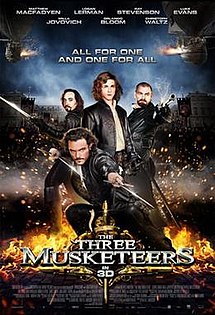★★
*** Warning: This review contains spoilers!! ***

Ugh. So much of my time watching this mini-series was spent feeling disappointed that I really can't bring myself to give it more than 2 stars.
Where do I begin?
Of course, whenever a movie is based on a
book, every way in which the movie deviates from the book is a point of criticism for me. I do understand that in order to simplify the story for the screen, the story sometimes needs to be condensed, or characters omitted. In this way, it did not really bother me at all that Eugenie Danglars and Julie Morrel were left out, or that Madame Danglar's affair with Lucien DeBray (also completely omitted) was not included.
I can't, however, so easily overlook other omissions or modifications that seemed to serve no purpose. Haydee was not introduced until much later in the story, which was detrimental to the Count's character development. Her mere presence upon their arrival in Paris is what gave the Count an air of mystery and eccentricity. Without Haydee, the Count came across as just another rich guy.
I suppose it made sense, for simplicity's sake, to separate Benedetto from Bertuccio, but was it really necessary to change Benedetto's name? His role became so minor, his entire relationship with the Count having been omitted, that the whole court scene in which he identifies Villefort as his father was omitted! This scene was pivotal in the book, filled with drama, and without it, Villefort doesn't descend into madness as he does in the book.
And speaking of Villefort - Madame Villefort's cherished son, Edward, was completely left out as well. Indeed, he had a small role to play, but it was significant in that it was only upon his death that the Count of Monte Cristo realized - by his own accord - that his vengeance had gone too far.
Instead of having that meaningful moment of self-realization, the movie gives us the Count's realization through Camille, who was not in the book at all and who was nothing but an annoying, infuriating distraction. At one point in the movie, Monte Cristo calls Valentine "too blond, too insipid" - he might as well have been talking about Camille, and yet, he supposedly fell for her! A huge part of the Count of Monte Cristo's character was his long-held belief that having had his heart broken by Mercedes, he did not think he was capable, nor did he think he was worthy, of loving again. And even though we saw a glimmer of hope in Monte Cristo, it wasn't until after
everything unfolded that he allowed himself to feel love again. The one redeeming thing about Camille is that the Count did not end up with her.
But wait, there's more. Instead of progressing chronologically from the beginning, the movie relied too much on flashbacks to explain why Edmond Dantes was in prison in the first place, and it never really explained the motivation of Danglars or Fernand. We never saw a true portrait of the young, happy, life-loving, filled-with-potential Edmond, and so the viewer never got a good sense for what was really sacrified when Edmond was sent to prison.
In the book, it was clear that the only way Edmond was able to survive so many years in prison was because he and the Abbe Faria devoted their time to Edmond's all-around education - in politics, languages, alchemy, etc. Why did the movie dismiss all that, and say that the abbe taught him nothing?!
The movie also took strange liberties to introduce a sexual angle to the story. Besides the booty call with Camille (which was LAME-O!), Edmond encountered a superfluous prostitute when he first escaped from prison, and then the judge who pardoned Peppino had a weird fetish! Why bother with that stuff?
Overall, the lack of attention to details was disappointing. The "red silk purse" represented so much in the book, why change it to a dull brown sack!? The portrait of Mercedes looking out to sea let the reader know that Mercedes never stopped loving Edmond - so why leave it out of the movie?
Finally, much of the casting and character portrayals just didn't seem right. I really did not find Gerard Depardieu convincing at all. He was not the imposing figure I've always imagined the Count to be. Instead, he was stocky and fat and his shoulders were distractingly broad. Albert did not have any of the joie de vivre that he had in the book, and one of the best scenes in the book - when Albert slept peacefully while in Luigi Vampa's lair - was, of course, omitted. Fernand looked about 20 years too old.
So, was there anything I liked about this mini-series? Honestly, I didn't mind the new, Hollywood ending, because deep down I sort of wished for that ending in the book, too. I liked the way the movie gave us a glimpse of the Count's alchemy lab, so we see how he came to possess so many vials of potions and antidotes. Mostly, though, as I watched the episodes, I found myself just waiting for the series to end.
 Definitely an action-adventure flick. The movie has a lot more swashbuckling and gun fighting than the book, and it's clear this is a Hollywood production. I didn't realize until afterwards that the movie was intended for 3D, and in retrospect, it probably would have been a lot more impressive as a big screen, 3D experience.
Definitely an action-adventure flick. The movie has a lot more swashbuckling and gun fighting than the book, and it's clear this is a Hollywood production. I didn't realize until afterwards that the movie was intended for 3D, and in retrospect, it probably would have been a lot more impressive as a big screen, 3D experience.








